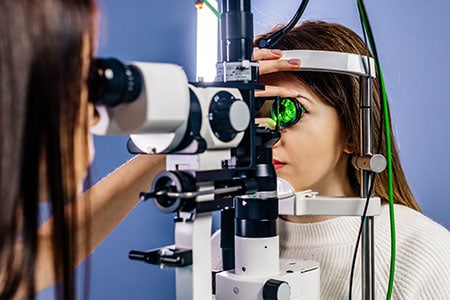All Categories
Featured
Healthy and balanced vision is a cornerstone of lifestyle, yet many individuals ignore the value of nourishment in maintaining eye health. A diet regimen rich in certain nutrients can protect your eyes, reduce the danger of developing typical eye conditions, and support overall eye feature. Let's discover exactly how nourishment influences your sight and the essential nutrients you need to consist of in your daily meals.
Important Nutrients for Eye Health
Vitamin A. Known for its role in protecting vision, vitamin A is vital for preserving a healthy and balanced cornea and enabling low-light vision. Deficiency in vitamin A can result in night loss of sight and various other severe eye conditions. Exceptional resources consist of carrots, pleasant potatoes, and dark leafy greens.
Lutein and Zeaxanthin. Discovered in high concentrations in the retina, these antioxidants shield versus damage brought on by blue light and oxidative stress and anxiety. Consuming foods like spinach, kale, broccoli, and eggs can help keep your eyes healthy and balanced.
Omega-3 Fatty Acids. Omega-3s are vital for the health and wellness of the retina and can help in reducing signs and symptoms of completely dry eye disorder. Include fatty fish such as salmon, tuna, and mackerel in your diet, or go with plant-based sources like chia seeds and walnuts.
Vitamin C. An effective anti-oxidant, vitamin C supports the wellness of capillary in the eyes and might minimize the risk of cataracts. Foods rich in vitamin C include oranges, strawberries, bell peppers, and tomatoes.
Vitamin E. This nutrient secures eye cells from oxidative damages. Integrate almonds, sunflower seeds, and avocados right into your meals to boost vitamin E levels.
Zinc. Zinc plays a key function in transferring vitamin A from the liver to the retina, aiding in the manufacturing of melanin, a protective pigment in the eyes. Foods such as oysters, beef, and fortified cereals are excellent resources.
![]()
Stopping Eye Issues With Diet Plan
Macular Deterioration: Antioxidants like lutein, zeaxanthin, and vitamins C and E can aid slow the progression of age-related macular degeneration (AMD)
Cataracts: Ample consumption of vitamin C and various other anti-oxidants might delay the start or stop of cataracts.
![]()
Dry Eyes: Omega-3 fats help improve tear high quality and alleviate dry eye signs and symptoms.
Diabetic Retinopathy: A diet regimen low in refined sugars and abundant in whole foods can assist take care of blood glucose degrees, lowering the risk of this problem in individuals with diabetes.
Practical Nourishment Tips
Diversify Your Diet Regimen: Consist of a selection of fruits, vegetables, lean healthy proteins, and entire grains to guarantee you're obtaining a wide variety of nutrients.
Limit Processed Foods: Decrease intake of sugarcoated and unhealthy fats, which can add to systemic health and wellness issues impacting your eyes.
Stay Hydrated: Appropriate hydration supports tear manufacturing and prevents eye dry skin.
Think About Supplements: If your diet regimen does not have certain nutrients, get in touch with a medical care company about taking supplements for far better eye health.
Conclusion
![]()
Good nourishment is a vital aspect of maintaining ideal eye health and wellness. By incorporating nutrient-dense foods into your diet regimen, you can lower the danger of eye illness and safeguard your vision for the long term. Making informed dietary selections today can secure your vision for several years ahead. An appointment with a nutritional expert or healthcare professional can give individualized support customized to your requirements. if you're unclear where to begin.
Important Nutrients for Eye Health
Vitamin A. Known for its role in protecting vision, vitamin A is vital for preserving a healthy and balanced cornea and enabling low-light vision. Deficiency in vitamin A can result in night loss of sight and various other severe eye conditions. Exceptional resources consist of carrots, pleasant potatoes, and dark leafy greens.
Lutein and Zeaxanthin. Discovered in high concentrations in the retina, these antioxidants shield versus damage brought on by blue light and oxidative stress and anxiety. Consuming foods like spinach, kale, broccoli, and eggs can help keep your eyes healthy and balanced.
Omega-3 Fatty Acids. Omega-3s are vital for the health and wellness of the retina and can help in reducing signs and symptoms of completely dry eye disorder. Include fatty fish such as salmon, tuna, and mackerel in your diet, or go with plant-based sources like chia seeds and walnuts.
Vitamin C. An effective anti-oxidant, vitamin C supports the wellness of capillary in the eyes and might minimize the risk of cataracts. Foods rich in vitamin C include oranges, strawberries, bell peppers, and tomatoes.
Vitamin E. This nutrient secures eye cells from oxidative damages. Integrate almonds, sunflower seeds, and avocados right into your meals to boost vitamin E levels.
Zinc. Zinc plays a key function in transferring vitamin A from the liver to the retina, aiding in the manufacturing of melanin, a protective pigment in the eyes. Foods such as oysters, beef, and fortified cereals are excellent resources.

Stopping Eye Issues With Diet Plan
Macular Deterioration: Antioxidants like lutein, zeaxanthin, and vitamins C and E can aid slow the progression of age-related macular degeneration (AMD)
Cataracts: Ample consumption of vitamin C and various other anti-oxidants might delay the start or stop of cataracts.

Dry Eyes: Omega-3 fats help improve tear high quality and alleviate dry eye signs and symptoms.
Diabetic Retinopathy: A diet regimen low in refined sugars and abundant in whole foods can assist take care of blood glucose degrees, lowering the risk of this problem in individuals with diabetes.
Practical Nourishment Tips
Diversify Your Diet Regimen: Consist of a selection of fruits, vegetables, lean healthy proteins, and entire grains to guarantee you're obtaining a wide variety of nutrients.
Limit Processed Foods: Decrease intake of sugarcoated and unhealthy fats, which can add to systemic health and wellness issues impacting your eyes.
Stay Hydrated: Appropriate hydration supports tear manufacturing and prevents eye dry skin.
Think About Supplements: If your diet regimen does not have certain nutrients, get in touch with a medical care company about taking supplements for far better eye health.
Conclusion

Good nourishment is a vital aspect of maintaining ideal eye health and wellness. By incorporating nutrient-dense foods into your diet regimen, you can lower the danger of eye illness and safeguard your vision for the long term. Making informed dietary selections today can secure your vision for several years ahead. An appointment with a nutritional expert or healthcare professional can give individualized support customized to your requirements. if you're unclear where to begin.
Latest Posts
Discover Limited-Time Auto Repair Offers in Chicago at Montclare Auto Repair
Published en
1 min read
Check Out Outstanding Auto Repair Care in Chicago – Expert Care for Your Vehicle
Published en
1 min read
Recognizing Roofing Guarantees: What Homeowners Ought To Know
Published en
1 min read
More
Latest Posts
Discover Limited-Time Auto Repair Offers in Chicago at Montclare Auto Repair
Published May 26, 25
1 min read
Check Out Outstanding Auto Repair Care in Chicago – Expert Care for Your Vehicle
Published May 26, 25
1 min read
Recognizing Roofing Guarantees: What Homeowners Ought To Know
Published May 25, 25
1 min read